
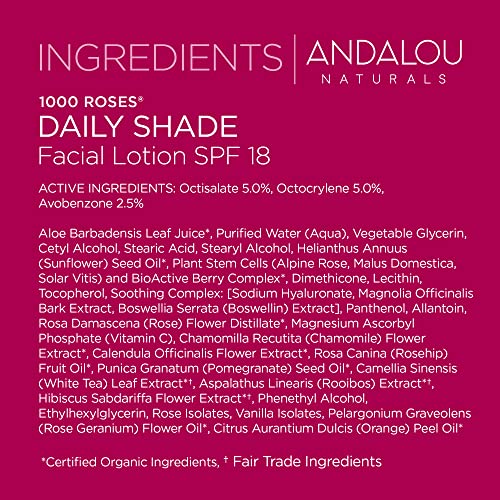
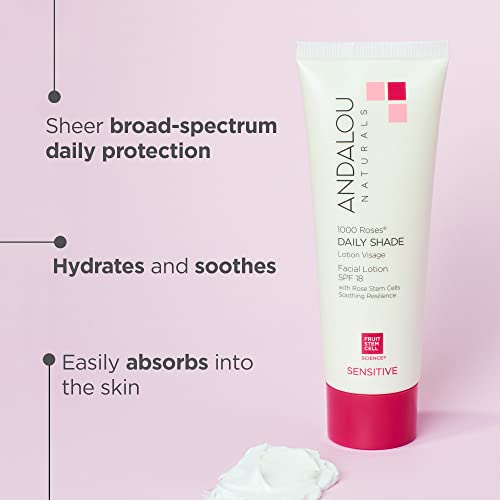
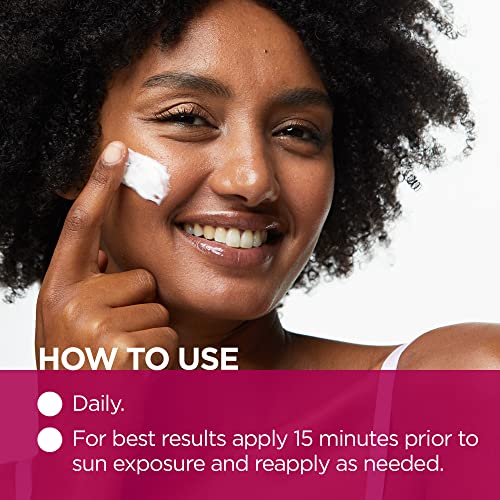
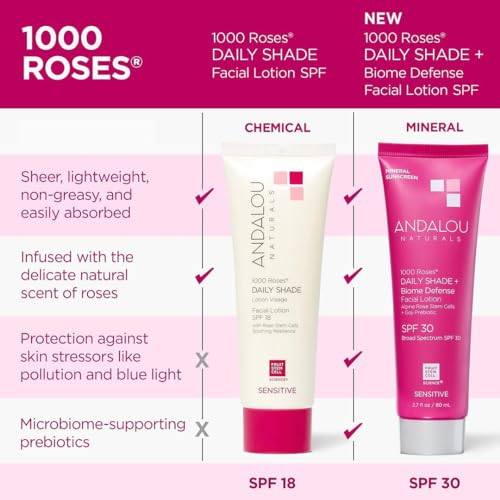
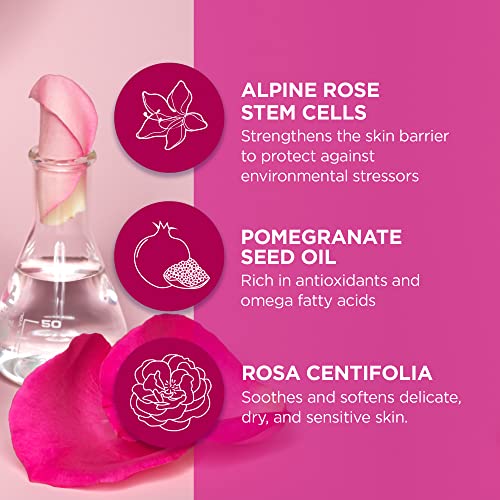
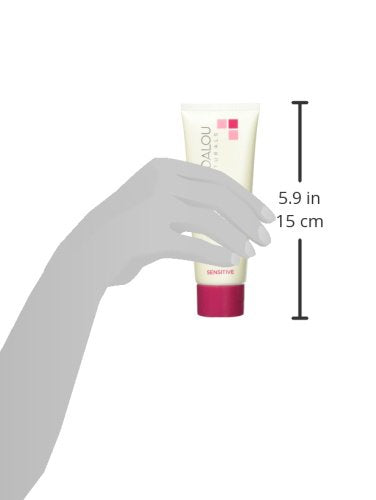
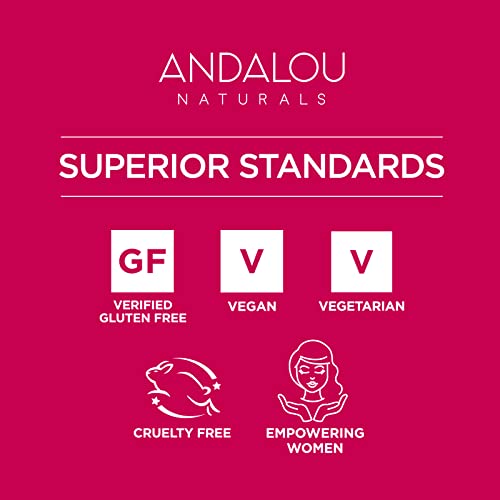
Andalou Naturals Face Sunscreen - Hydrating SPF 18, Soothes Sensitive Skin - 2.7 Fl Oz


Pelargonium Graveolens (Geranium) Flower Oil
High RiskPelargonium graveolens (geranium) flower oil is a volatile essential oil extracted from the leaves and stems of the Pelargonium graveolens plant. It is commonly used in cosmetics for its fragrance and potential skin benefits. This oil is characterized by its floral scent and is often included in formulations for aromatherapy, skincare, and personal care products.
Sustai Insights
Pelargonium graveolens flower oil offers functional benefits such as fragrance enhancement in cosmetic formulations. However, it has a high allergenic potential, posing risks of skin irritation and sensitization. Environmental concerns include its potential as a pollutant, though it is not bioaccumulative. Regulatory bodies do not currently restrict its use, but safety assessments are essential due to its allergenic properties. Overall, the ingredient carries a high risk level, necessitating cautious use, especially for sensitive populations. Alternatives such as synthetic fragrance compounds may mitigate allergenic risks.
Phenethyl Alcohol
Medium RiskPhenethyl alcohol is an aromatic alcohol commonly used in cosmetic formulations. It functions primarily as a solvent and a preservative, contributing to product stability and enhancing the fragrance profile.
Sustai Insights
Phenethyl alcohol exhibits functional benefits as a preservative and solvent in cosmetic products, with some sustainability credentials due to its natural origin. However, it is associated with moderate allergy concerns and low risks of carcinogenicity and reproductive toxicity. Regulatory bodies have imposed specific use restrictions, highlighting the need for cautious application. Overall, the risk assessment indicates a medium risk level, warranting safe usage practices and consideration of alternatives like natural preservatives.
Citrus Aurantium Dulcis (Orange) Peel Oil
Medium RiskCitrus aurantium dulcis (orange) peel oil is derived from the peel of oranges and is commonly used in cosmetic and personal care products for its fragrance and potential skin benefits. It is known for its aromatic properties and is often included in formulations aimed at enhancing scent profiles.
Sustai Insights
Citrus aurantium dulcis (orange) peel oil offers functional benefits such as providing a pleasant scent and potential antimicrobial properties. However, it poses a high allergy risk and may cause skin irritation in sensitive individuals. Environmental concerns include moderate persistence and potential to contribute to pollution. Regulatory warnings indicate restrictions on use in certain products. Overall, the risk level is assessed as medium, and users are advised to practice caution, particularly those with known allergies. Alternatives like sweet orange essential oil may provide similar benefits with potentially lower risks.
Dimethicone
Medium RiskDimethicone, also known as polymethylsiloxane, is a silicone-based polymer commonly used in personal care products for its smooth application and skin conditioning properties. It acts primarily as an emollient, providing a silky feel while forming a protective barrier on the skin.
Sustai Insights
Dimethicone provides functional benefits as an effective emollient and skin protectant, contributing to product stability and sensory attributes. It is considered low risk for carcinogenicity, allergies, and reproductive toxicity, but has moderate usage restrictions due to environmental persistence and bioaccumulation concerns. Regulatory bodies have issued advisories regarding its use in certain formulations. Overall, its risk level is assessed as medium, and users are advised to follow recommended usage practices. Alternatives like natural oils or butters may offer sustainable options.
Octisalate
Medium RiskOctisalate is a weak UVB absorber commonly used in sunscreen formulations to enhance sun protection. It functions by absorbing ultraviolet radiation, thereby preventing sunburn and skin damage. This ingredient is often combined with other UV filters to achieve a broad-spectrum protective effect.
Sustai Insights
Octisalate provides effective UVB protection in sun care products, contributing to skin safety by reducing sunburn risk. Its environmental impact is moderate, with some concerns about its potential as an endocrine disruptor and possible restrictions in specific regions. Health risks are generally low, with low to moderate concerns regarding allergies and immunotoxicity. Regulatory bodies have verified its safe use under certain conditions, leading to an overall moderate risk assessment. For safer alternatives, consider mineral-based UV filters or other approved organic compounds.
Lecithin
Medium RiskLecithin is a naturally occurring lipid found in various plant and animal tissues, primarily composed of phospholipids. It serves as an emulsifier, stabilizing mixtures of oil and water, and is commonly used in food, cosmetics, and pharmaceuticals to improve texture and extend shelf life.
Sustai Insights
Lecithin provides functional benefits as an effective emulsifier and stabilizer, enhancing product texture while being sustainably sourced from natural origins. Health risks are generally low, with moderate concerns regarding allergies and immunotoxicity but minimal cancer or reproductive toxicity risks. Environmental hazards are limited, and it is not classified as a pollutant. Regulatory bodies impose few restrictions. Overall, lecithin presents a medium risk, suggesting caution in usage, especially for sensitive individuals. Alternatives include sunflower lecithin or other plant-based emulsifiers that may offer similar benefits with reduced allergenic potential.
Magnolia Officinalis Bark Extract
Low RiskMagnolia officinalis bark extract is an extract derived from the bark of the Magnolia officinalis tree, commonly used in cosmetics and personal care products for its potential calming and anti-inflammatory properties. It serves various functions, including skin soothing and antioxidant activity.
Sustai Insights
Magnolia officinalis bark extract offers functional benefits such as skin soothing and potential antioxidant effects. It is considered sustainably sourced with low risk of allergenic reactions, carcinogenicity, and reproductive toxicity. Environmental risks are minimal, with no evidence of bioaccumulation. Regulatory status indicates no current restrictions, suggesting a low overall risk. Safe usage involves standard cosmetic concentrations, with few known adverse effects. Alternative extracts could provide similar benefits, but this ingredient remains a low-risk choice for formulation.
Hibiscus Sabdariffa (Roselle) Flower Extract
Low RiskHibiscus sabdariffa (roselle) flower extract is derived from the calyx of the hibiscus plant, used primarily for its potential antioxidant properties and as a natural colorant in various cosmetic and food products.
Sustai Insights
Hibiscus sabdariffa flower extract offers functional benefits such as antioxidant properties and natural coloring, while being sustainably sourced with low environmental impact. Health risks, including irritant potential, are minimal, and it is not classified as a carcinogen or allergen. Regulatory status is favorable, with no current restrictions. Overall, the risk level is assessed as low, making it a safe choice in formulations.
Allantoin
Low RiskAllantoin is a naturally occurring nitrogenous compound found in various plants and animals. It is commonly used in cosmetic formulations for its soothing and moisturizing properties, as well as its ability to promote skin cell turnover and healing.
Sustai Insights
Allantoin offers functional benefits such as skin soothing, hydration, and promoting cell regeneration. It is generally recognized as safe, with low concerns regarding carcinogenicity, allergies, and reproductive toxicity. Environmentally, it poses minimal risks, being biodegradable and sustainably sourced. Regulatory bodies do not impose significant restrictions on its use. Overall, the risk level associated with allantoin is low, making it a favorable ingredient in personal care products.
Stearic Acid
Low RiskStearic acid is a naturally occurring fatty acid commonly found in animal and vegetable fats. It functions primarily as an emulsifier, thickener, and stabilizer in cosmetic and personal care products, providing texture and consistency.
Sustai Insights
Stearic acid offers functional benefits such as effective emulsification and stabilization of formulations. It is derived from renewable sources and is biodegradable, contributing to its sustainability profile. Health risks are low, with minimal concerns regarding carcinogenicity, allergies, or reproductive toxicity. Environmental risks are also low, with no significant pollutants or bioaccumulation concerns noted. Regulatory bodies, including the FDA, do not impose restrictions on its use. Overall, stearic acid is assessed as low risk, and its safe usage practices are well-established, with no significant alternatives needed.
Magnesium Ascorbyl Phosphate
Low RiskMagnesium ascorbyl phosphate is a vitamin C derivative used in cosmetics primarily for its antioxidant properties and skin-brightening effects. It is often included in formulations for its ability to stabilize vitamin C, enhancing its efficacy in skin care products.
Sustai Insights
Magnesium ascorbyl phosphate offers functional benefits as an effective antioxidant and skin-brightening agent, contributing to improved skin appearance. It has a low risk profile concerning health, with minimal concerns regarding carcinogenicity, allergies, and reproductive toxicity. Environmental risks are also low, with no significant pollutant or bioaccumulation potential noted. Regulatory assessments indicate no major restrictions, supporting its safe use in cosmetic products. Overall, the ingredient is assessed as low risk, with safe usage practices recommended for optimal effectiveness.
Panthenol, D
Low RiskPanthenol, also known as provitamin B5, is a humectant commonly used in cosmetic and personal care products. It functions primarily as a moisturizer, enhancing skin hydration and improving the appearance of hair by imparting shine and softness.
Sustai Insights
Panthenol is effective in retaining moisture, thus providing functional benefits for skin and hair care products. It is generally recognized as safe, with low concerns regarding carcinogenicity, allergies, and developmental toxicity. However, potential cumulative exposure from multiple sources exists. Environmental risks are minimal, and it is not bioaccumulative. Regulatory bodies have not issued significant warnings; therefore, the overall risk level is assessed as low. For optimal use, it is recommended to follow product guidelines, and alternatives such as glycerin may also be considered for moisturizing effects.
Ethylhexylglycerin
Low RiskEthylhexylglycerin is a glyceryl ether utilized primarily as a skin-conditioning agent and preservative in cosmetic formulations. It enhances the efficacy of preservatives and serves as a humectant, helping to retain moisture in the skin. This ingredient is commonly found in various personal care products.
Sustai Insights
Ethylhexylglycerin offers functional benefits as an effective preservative and skin-conditioning agent, contributing to product longevity and moisture retention. Health risks are generally low, with minor concerns regarding allergic contact dermatitis and irritant potential. Environmentally, it poses minimal risks, not being recognized as a pollutant or bioaccumulative. Regulatory bodies have imposed few restrictions, indicating its safety for use. Overall, its risk level is assessed as low, making it a viable option in cosmetic formulations. For those seeking alternatives, ingredients like propanediol may serve similar functions with potentially lower irritation profiles.
Sodium Acetylhyaluronate
Low RiskSodium acetylhyaluronate is a sodium salt derivative of hyaluronic acid, commonly used in cosmetic formulations for its hydrating properties. It functions primarily as a humectant, attracting moisture to the skin and helping to maintain hydration levels in various personal care products.
Sustai Insights
Sodium acetylhyaluronate is recognized for its effective moisture-retaining properties, enhancing skin hydration and improving product texture. It has low health risks, with negligible concerns regarding carcinogenicity, allergies, or reproductive toxicity. Environmentally, it poses minimal risks and is not associated with significant pollution or bioaccumulation. Regulatory assessments indicate no current restrictions. Overall, it is considered low risk, making it a favorable ingredient in cosmetic formulations.
Cetyl Alcohol
Low RiskCetyl alcohol is a long-chain organic alcohol commonly used in cosmetic formulations. It serves as an emollient, emulsifier, and thickening agent, enhancing the texture and stability of products. Cetyl alcohol is derived from natural sources, such as coconut or palm oil, and is often included in creams, lotions, and hair conditioners.
Sustai Insights
Cetyl alcohol offers functional benefits as an emollient and emulsifier, improving product texture and stability. It is biodegradable and sourced from renewable materials, contributing to sustainability. Health risks are minimal, with low concerns for carcinogenicity, allergies, or reproductive toxicity. Environmental impact is also low, with no significant pollutant or bioaccumulation potential. Regulatory bodies have not placed restrictions on its use, indicating a favorable safety profile. Overall, cetyl alcohol is assessed as low risk, and safe usage practices include ensuring proper formulation concentrations.
Punica Granatum (Pomegranate) Seed Oil
Low RiskPunica granatum (pomegranate) seed oil is derived from the seeds of the pomegranate fruit. It serves primarily as a moisturizer and emollient in cosmetic formulations, contributing to skin hydration and texture improvement. The oil is rich in fatty acids and antioxidants, enhancing its functional properties in personal care products.
Sustai Insights
Punica granatum (pomegranate) seed oil offers functional benefits as a moisturizer and potential antioxidant. It is generally considered low risk for cancer, allergies, and reproductive toxicity, while contamination concerns are noted as low to moderate. Regulatory assessments do not impose significant restrictions on its use. Environmental impacts are minimal, and it is not classified as bioaccumulative. Safe usage practices are recommended, and alternatives may include other plant-based oils. Overall, the ingredient is assessed as low risk based on current scientific consensus.
Water
Low RiskWater is a clear, colorless liquid essential for various biological processes. It serves as a solvent in formulations, facilitating the dissolution of other ingredients and enhancing product texture and application. Additionally, water plays a crucial role in hydration and is a key component in many cosmetic and personal care products.
Sustai Insights
Water is an effective solvent and hydrator, contributing to the texture and efficacy of formulations. It is biodegradable and generally regarded as safe, with low concerns regarding carcinogenicity, allergies, and reproductive toxicity. However, excessive water usage can lead to environmental concerns, particularly regarding resource depletion. Regulatory bodies do not impose restrictions on water use in cosmetics. Overall, the risks associated with water are low, making it a safe and essential ingredient.
Tocopherol, D Alpha
Low RiskTocopherol, specifically d-alpha tocopherol, is a naturally occurring form of Vitamin E. It is commonly used in cosmetic and personal care products primarily for its antioxidant properties, helping to protect formulations from oxidation and extend shelf life.
Sustai Insights
D-alpha tocopherol provides effective antioxidant benefits, contributing to product stability. It is sustainably sourced and generally regarded as safe, with low concerns regarding carcinogenicity, allergies, and reproductive toxicity. However, there are minor concerns about endocrine disruption. Regulatory bodies have not imposed significant restrictions, indicating low overall risk. Recommended usage practices include adhering to established safe concentration thresholds. Alternatives, such as other forms of Vitamin E or plant-based antioxidants, may also be considered.
Diethylhexyl 2,6 Naphthalate
Low RiskDiethylhexyl 2,6 naphthalate is a phthalate compound primarily used as a plasticizer in various products, enhancing flexibility and durability. It is commonly found in materials such as plastics, adhesives, and coatings, contributing to product performance.
Sustai Insights
Diethylhexyl 2,6 naphthalate serves as an effective plasticizer, improving the workability and longevity of materials. While it has low concerns regarding cancer, allergies, and reproductive toxicity, there are moderate risks related to cumulative exposure from multiple sources. Environmentally, it is not classified as bioaccumulative or a significant pollutant. Regulatory bodies currently do not impose restrictions on its use. Overall, the risk level is considered low, and safer alternatives may include other biodegradable plasticizers.
Aspalathus Linearis (Rooibos) Extract
Low RiskAspalathus linearis extract is derived from the leaves of the rooibos plant, commonly used in beverages and cosmetic products for its antioxidant properties and potential skin benefits. It is known for its high content of flavonoids, which contribute to its functional role in formulations.
Sustai Insights
Aspalathus linearis extract offers functional benefits such as antioxidant properties and skin soothing effects, making it a valuable ingredient in cosmetics. It is sustainably sourced and poses low health risks, including negligible concerns for carcinogenicity and allergies. Environmental risks are minimal, with no significant pollutants or bioaccumulation issues. Regulatory assessments indicate no restrictions, reflecting its safe use in various applications. Overall, it is assessed as low risk, with no substantial adverse effects noted, making it a suitable choice for consumers.
Helianthus Annuus (Sunflower) Seed
Low RiskHelianthus annuus (sunflower) seed is derived from the seeds of the sunflower plant and is commonly used in various cosmetic and personal care products. It serves primarily as an emollient and skin conditioning agent, providing moisture and enhancing the texture of formulations.
Sustai Insights
Helianthus annuus (sunflower) seed offers functional benefits, including skin conditioning and moisturizing properties, while being sustainably sourced and biodegradable. Health risks are minimal, with low concerns for carcinogenicity, allergies, and reproductive toxicity. Environmentally, it presents low risks of pollution or bioaccumulation. Regulatory assessments indicate no current restrictions. Overall, it is considered a low-risk ingredient, and safe usage practices should be maintained. Alternative ingredients may include other plant-based oils, but the sunflower seed oil remains a viable option.
Stearyl Alcohol
Low RiskStearyl alcohol is a compound produced from the hydrogenation of stearic acid, commonly used in cosmetic formulations as an emulsifier and thickening agent. It helps stabilize products by blending oil and water phases, enhancing texture and consistency.
Sustai Insights
Stearyl alcohol provides functional benefits as an emulsifier and stabilizer, contributing to improved product texture. It is generally regarded as safe with low concerns for cancer, allergies, and reproductive toxicity. However, it may cause moderate skin, eye, or respiratory irritation. Regulatory bodies do not impose significant restrictions, indicating a low overall risk. While it poses minimal health and environmental hazards, caution is advised for sensitive individuals. Alternatives like cetyl alcohol or plant-based emulsifiers may offer safer options for formulators.
Phenethyl Alcohol
Medium RiskPhenethyl alcohol is an aromatic alcohol commonly used in cosmetic formulations. It functions primarily as a solvent and a preservative, contributing to product stability and enhancing the fragrance profile.
Sustai Insights
Phenethyl alcohol exhibits functional benefits as a preservative and solvent in cosmetic products, with some sustainability credentials due to its natural origin. However, it is associated with moderate allergy concerns and low risks of carcinogenicity and reproductive toxicity. Regulatory bodies have imposed specific use restrictions, highlighting the need for cautious application. Overall, the risk assessment indicates a medium risk level, warranting safe usage practices and consideration of alternatives like natural preservatives.
Citrus Aurantium Dulcis (Orange) Peel Oil
Medium RiskCitrus aurantium dulcis (orange) peel oil is derived from the peel of oranges and is commonly used in cosmetic and personal care products for its fragrance and potential skin benefits. It is known for its aromatic properties and is often included in formulations aimed at enhancing scent profiles.
Sustai Insights
Citrus aurantium dulcis (orange) peel oil offers functional benefits such as providing a pleasant scent and potential antimicrobial properties. However, it poses a high allergy risk and may cause skin irritation in sensitive individuals. Environmental concerns include moderate persistence and potential to contribute to pollution. Regulatory warnings indicate restrictions on use in certain products. Overall, the risk level is assessed as medium, and users are advised to practice caution, particularly those with known allergies. Alternatives like sweet orange essential oil may provide similar benefits with potentially lower risks.
Magnolia Officinalis Bark Extract
Low RiskMagnolia officinalis bark extract is an extract derived from the bark of the Magnolia officinalis tree, commonly used in cosmetics and personal care products for its potential calming and anti-inflammatory properties. It serves various functions, including skin soothing and antioxidant activity.
Sustai Insights
Magnolia officinalis bark extract offers functional benefits such as skin soothing and potential antioxidant effects. It is considered sustainably sourced with low risk of allergenic reactions, carcinogenicity, and reproductive toxicity. Environmental risks are minimal, with no evidence of bioaccumulation. Regulatory status indicates no current restrictions, suggesting a low overall risk. Safe usage involves standard cosmetic concentrations, with few known adverse effects. Alternative extracts could provide similar benefits, but this ingredient remains a low-risk choice for formulation.
Hibiscus Sabdariffa (Roselle) Flower Extract
Low RiskHibiscus sabdariffa (roselle) flower extract is derived from the calyx of the hibiscus plant, used primarily for its potential antioxidant properties and as a natural colorant in various cosmetic and food products.
Sustai Insights
Hibiscus sabdariffa flower extract offers functional benefits such as antioxidant properties and natural coloring, while being sustainably sourced with low environmental impact. Health risks, including irritant potential, are minimal, and it is not classified as a carcinogen or allergen. Regulatory status is favorable, with no current restrictions. Overall, the risk level is assessed as low, making it a safe choice in formulations.
Allantoin
Low RiskAllantoin is a naturally occurring nitrogenous compound found in various plants and animals. It is commonly used in cosmetic formulations for its soothing and moisturizing properties, as well as its ability to promote skin cell turnover and healing.
Sustai Insights
Allantoin offers functional benefits such as skin soothing, hydration, and promoting cell regeneration. It is generally recognized as safe, with low concerns regarding carcinogenicity, allergies, and reproductive toxicity. Environmentally, it poses minimal risks, being biodegradable and sustainably sourced. Regulatory bodies do not impose significant restrictions on its use. Overall, the risk level associated with allantoin is low, making it a favorable ingredient in personal care products.
Stearic Acid
Low RiskStearic acid is a naturally occurring fatty acid commonly found in animal and vegetable fats. It functions primarily as an emulsifier, thickener, and stabilizer in cosmetic and personal care products, providing texture and consistency.
Sustai Insights
Stearic acid offers functional benefits such as effective emulsification and stabilization of formulations. It is derived from renewable sources and is biodegradable, contributing to its sustainability profile. Health risks are low, with minimal concerns regarding carcinogenicity, allergies, or reproductive toxicity. Environmental risks are also low, with no significant pollutants or bioaccumulation concerns noted. Regulatory bodies, including the FDA, do not impose restrictions on its use. Overall, stearic acid is assessed as low risk, and its safe usage practices are well-established, with no significant alternatives needed.
Magnesium Ascorbyl Phosphate
Low RiskMagnesium ascorbyl phosphate is a vitamin C derivative used in cosmetics primarily for its antioxidant properties and skin-brightening effects. It is often included in formulations for its ability to stabilize vitamin C, enhancing its efficacy in skin care products.
Sustai Insights
Magnesium ascorbyl phosphate offers functional benefits as an effective antioxidant and skin-brightening agent, contributing to improved skin appearance. It has a low risk profile concerning health, with minimal concerns regarding carcinogenicity, allergies, and reproductive toxicity. Environmental risks are also low, with no significant pollutant or bioaccumulation potential noted. Regulatory assessments indicate no major restrictions, supporting its safe use in cosmetic products. Overall, the ingredient is assessed as low risk, with safe usage practices recommended for optimal effectiveness.
Panthenol, D
Low RiskPanthenol, also known as provitamin B5, is a humectant commonly used in cosmetic and personal care products. It functions primarily as a moisturizer, enhancing skin hydration and improving the appearance of hair by imparting shine and softness.
Sustai Insights
Panthenol is effective in retaining moisture, thus providing functional benefits for skin and hair care products. It is generally recognized as safe, with low concerns regarding carcinogenicity, allergies, and developmental toxicity. However, potential cumulative exposure from multiple sources exists. Environmental risks are minimal, and it is not bioaccumulative. Regulatory bodies have not issued significant warnings; therefore, the overall risk level is assessed as low. For optimal use, it is recommended to follow product guidelines, and alternatives such as glycerin may also be considered for moisturizing effects.
Ethylhexylglycerin
Low RiskEthylhexylglycerin is a glyceryl ether utilized primarily as a skin-conditioning agent and preservative in cosmetic formulations. It enhances the efficacy of preservatives and serves as a humectant, helping to retain moisture in the skin. This ingredient is commonly found in various personal care products.
Sustai Insights
Ethylhexylglycerin offers functional benefits as an effective preservative and skin-conditioning agent, contributing to product longevity and moisture retention. Health risks are generally low, with minor concerns regarding allergic contact dermatitis and irritant potential. Environmentally, it poses minimal risks, not being recognized as a pollutant or bioaccumulative. Regulatory bodies have imposed few restrictions, indicating its safety for use. Overall, its risk level is assessed as low, making it a viable option in cosmetic formulations. For those seeking alternatives, ingredients like propanediol may serve similar functions with potentially lower irritation profiles.
Sodium Acetylhyaluronate
Low RiskSodium acetylhyaluronate is a sodium salt derivative of hyaluronic acid, commonly used in cosmetic formulations for its hydrating properties. It functions primarily as a humectant, attracting moisture to the skin and helping to maintain hydration levels in various personal care products.
Sustai Insights
Sodium acetylhyaluronate is recognized for its effective moisture-retaining properties, enhancing skin hydration and improving product texture. It has low health risks, with negligible concerns regarding carcinogenicity, allergies, or reproductive toxicity. Environmentally, it poses minimal risks and is not associated with significant pollution or bioaccumulation. Regulatory assessments indicate no current restrictions. Overall, it is considered low risk, making it a favorable ingredient in cosmetic formulations.
Cetyl Alcohol
Low RiskCetyl alcohol is a long-chain organic alcohol commonly used in cosmetic formulations. It serves as an emollient, emulsifier, and thickening agent, enhancing the texture and stability of products. Cetyl alcohol is derived from natural sources, such as coconut or palm oil, and is often included in creams, lotions, and hair conditioners.
Sustai Insights
Cetyl alcohol offers functional benefits as an emollient and emulsifier, improving product texture and stability. It is biodegradable and sourced from renewable materials, contributing to sustainability. Health risks are minimal, with low concerns for carcinogenicity, allergies, or reproductive toxicity. Environmental impact is also low, with no significant pollutant or bioaccumulation potential. Regulatory bodies have not placed restrictions on its use, indicating a favorable safety profile. Overall, cetyl alcohol is assessed as low risk, and safe usage practices include ensuring proper formulation concentrations.
Dimethicone
Medium RiskDimethicone, also known as polymethylsiloxane, is a silicone-based polymer commonly used in personal care products for its smooth application and skin conditioning properties. It acts primarily as an emollient, providing a silky feel while forming a protective barrier on the skin.
Sustai Insights
Dimethicone provides functional benefits as an effective emollient and skin protectant, contributing to product stability and sensory attributes. It is considered low risk for carcinogenicity, allergies, and reproductive toxicity, but has moderate usage restrictions due to environmental persistence and bioaccumulation concerns. Regulatory bodies have issued advisories regarding its use in certain formulations. Overall, its risk level is assessed as medium, and users are advised to follow recommended usage practices. Alternatives like natural oils or butters may offer sustainable options.
Punica Granatum (Pomegranate) Seed Oil
Low RiskPunica granatum (pomegranate) seed oil is derived from the seeds of the pomegranate fruit. It serves primarily as a moisturizer and emollient in cosmetic formulations, contributing to skin hydration and texture improvement. The oil is rich in fatty acids and antioxidants, enhancing its functional properties in personal care products.
Sustai Insights
Punica granatum (pomegranate) seed oil offers functional benefits as a moisturizer and potential antioxidant. It is generally considered low risk for cancer, allergies, and reproductive toxicity, while contamination concerns are noted as low to moderate. Regulatory assessments do not impose significant restrictions on its use. Environmental impacts are minimal, and it is not classified as bioaccumulative. Safe usage practices are recommended, and alternatives may include other plant-based oils. Overall, the ingredient is assessed as low risk based on current scientific consensus.
Water
Low RiskWater is a clear, colorless liquid essential for various biological processes. It serves as a solvent in formulations, facilitating the dissolution of other ingredients and enhancing product texture and application. Additionally, water plays a crucial role in hydration and is a key component in many cosmetic and personal care products.
Sustai Insights
Water is an effective solvent and hydrator, contributing to the texture and efficacy of formulations. It is biodegradable and generally regarded as safe, with low concerns regarding carcinogenicity, allergies, and reproductive toxicity. However, excessive water usage can lead to environmental concerns, particularly regarding resource depletion. Regulatory bodies do not impose restrictions on water use in cosmetics. Overall, the risks associated with water are low, making it a safe and essential ingredient.
Pelargonium Graveolens (Geranium) Flower Oil
High RiskPelargonium graveolens (geranium) flower oil is a volatile essential oil extracted from the leaves and stems of the Pelargonium graveolens plant. It is commonly used in cosmetics for its fragrance and potential skin benefits. This oil is characterized by its floral scent and is often included in formulations for aromatherapy, skincare, and personal care products.
Sustai Insights
Pelargonium graveolens flower oil offers functional benefits such as fragrance enhancement in cosmetic formulations. However, it has a high allergenic potential, posing risks of skin irritation and sensitization. Environmental concerns include its potential as a pollutant, though it is not bioaccumulative. Regulatory bodies do not currently restrict its use, but safety assessments are essential due to its allergenic properties. Overall, the ingredient carries a high risk level, necessitating cautious use, especially for sensitive populations. Alternatives such as synthetic fragrance compounds may mitigate allergenic risks.
Octisalate
Medium RiskOctisalate is a weak UVB absorber commonly used in sunscreen formulations to enhance sun protection. It functions by absorbing ultraviolet radiation, thereby preventing sunburn and skin damage. This ingredient is often combined with other UV filters to achieve a broad-spectrum protective effect.
Sustai Insights
Octisalate provides effective UVB protection in sun care products, contributing to skin safety by reducing sunburn risk. Its environmental impact is moderate, with some concerns about its potential as an endocrine disruptor and possible restrictions in specific regions. Health risks are generally low, with low to moderate concerns regarding allergies and immunotoxicity. Regulatory bodies have verified its safe use under certain conditions, leading to an overall moderate risk assessment. For safer alternatives, consider mineral-based UV filters or other approved organic compounds.
Tocopherol, D Alpha
Low RiskTocopherol, specifically d-alpha tocopherol, is a naturally occurring form of Vitamin E. It is commonly used in cosmetic and personal care products primarily for its antioxidant properties, helping to protect formulations from oxidation and extend shelf life.
Sustai Insights
D-alpha tocopherol provides effective antioxidant benefits, contributing to product stability. It is sustainably sourced and generally regarded as safe, with low concerns regarding carcinogenicity, allergies, and reproductive toxicity. However, there are minor concerns about endocrine disruption. Regulatory bodies have not imposed significant restrictions, indicating low overall risk. Recommended usage practices include adhering to established safe concentration thresholds. Alternatives, such as other forms of Vitamin E or plant-based antioxidants, may also be considered.
Diethylhexyl 2,6 Naphthalate
Low RiskDiethylhexyl 2,6 naphthalate is a phthalate compound primarily used as a plasticizer in various products, enhancing flexibility and durability. It is commonly found in materials such as plastics, adhesives, and coatings, contributing to product performance.
Sustai Insights
Diethylhexyl 2,6 naphthalate serves as an effective plasticizer, improving the workability and longevity of materials. While it has low concerns regarding cancer, allergies, and reproductive toxicity, there are moderate risks related to cumulative exposure from multiple sources. Environmentally, it is not classified as bioaccumulative or a significant pollutant. Regulatory bodies currently do not impose restrictions on its use. Overall, the risk level is considered low, and safer alternatives may include other biodegradable plasticizers.
Lecithin
Medium RiskLecithin is a naturally occurring lipid found in various plant and animal tissues, primarily composed of phospholipids. It serves as an emulsifier, stabilizing mixtures of oil and water, and is commonly used in food, cosmetics, and pharmaceuticals to improve texture and extend shelf life.
Sustai Insights
Lecithin provides functional benefits as an effective emulsifier and stabilizer, enhancing product texture while being sustainably sourced from natural origins. Health risks are generally low, with moderate concerns regarding allergies and immunotoxicity but minimal cancer or reproductive toxicity risks. Environmental hazards are limited, and it is not classified as a pollutant. Regulatory bodies impose few restrictions. Overall, lecithin presents a medium risk, suggesting caution in usage, especially for sensitive individuals. Alternatives include sunflower lecithin or other plant-based emulsifiers that may offer similar benefits with reduced allergenic potential.
Aspalathus Linearis (Rooibos) Extract
Low RiskAspalathus linearis extract is derived from the leaves of the rooibos plant, commonly used in beverages and cosmetic products for its antioxidant properties and potential skin benefits. It is known for its high content of flavonoids, which contribute to its functional role in formulations.
Sustai Insights
Aspalathus linearis extract offers functional benefits such as antioxidant properties and skin soothing effects, making it a valuable ingredient in cosmetics. It is sustainably sourced and poses low health risks, including negligible concerns for carcinogenicity and allergies. Environmental risks are minimal, with no significant pollutants or bioaccumulation issues. Regulatory assessments indicate no restrictions, reflecting its safe use in various applications. Overall, it is assessed as low risk, with no substantial adverse effects noted, making it a suitable choice for consumers.
Helianthus Annuus (Sunflower) Seed
Low RiskHelianthus annuus (sunflower) seed is derived from the seeds of the sunflower plant and is commonly used in various cosmetic and personal care products. It serves primarily as an emollient and skin conditioning agent, providing moisture and enhancing the texture of formulations.
Sustai Insights
Helianthus annuus (sunflower) seed offers functional benefits, including skin conditioning and moisturizing properties, while being sustainably sourced and biodegradable. Health risks are minimal, with low concerns for carcinogenicity, allergies, and reproductive toxicity. Environmentally, it presents low risks of pollution or bioaccumulation. Regulatory assessments indicate no current restrictions. Overall, it is considered a low-risk ingredient, and safe usage practices should be maintained. Alternative ingredients may include other plant-based oils, but the sunflower seed oil remains a viable option.
Stearyl Alcohol
Low RiskStearyl alcohol is a compound produced from the hydrogenation of stearic acid, commonly used in cosmetic formulations as an emulsifier and thickening agent. It helps stabilize products by blending oil and water phases, enhancing texture and consistency.
Sustai Insights
Stearyl alcohol provides functional benefits as an emulsifier and stabilizer, contributing to improved product texture. It is generally regarded as safe with low concerns for cancer, allergies, and reproductive toxicity. However, it may cause moderate skin, eye, or respiratory irritation. Regulatory bodies do not impose significant restrictions, indicating a low overall risk. While it poses minimal health and environmental hazards, caution is advised for sensitive individuals. Alternatives like cetyl alcohol or plant-based emulsifiers may offer safer options for formulators.
Discover Andalou Naturals 1000 Roses Daily Shade Facial Lotion, a dual-purpose moisturizer and sunscreen with SPF 18. Infused with alpine rose stem cells, this lightweight formula hydrates while providing broad-spectrum protection, making it perfect for sensitive skin.
- Hydrating & Soothing Protection: Combines rose and fruit stem cells with pomegranate seed oil to soothe and hydrate, enhancing skin vitality effortlessly.
- Daily Use Convenience: Designed for everyday application, this ultra-sheer lotion is ideal for all-day wear. Apply 15 minutes before sun exposure for optimal results.
- Natural Ingredients: Made from 98% nature-derived, vegetarian ingredients, this lotion is gluten-free and cruelty-free, aligning with ethical consumer values.
- Fruit Stem Cell Science: Harnesses nature's antioxidant power to support healthy skin, making it suitable for a variety of skin types.
- Travel-Friendly Size: Compact 2.7 Fl Oz tube is perfect for on-the-go use, ensuring you can stay protected wherever you are.
Experience the gentle touch of nature while safeguarding your skin with Andalou Naturals.
Subscribe & Save with Sustai
- Best Price Guarantee: Always enjoy the lowest prices on sustainable home essentials.
- No Surprises: We’ll notify you before shipping. No hidden fees, ever.
- You’re in Charge: Change, pause, or cancel your subscription anytime with ease.
- Eco-Friendly Deliveries: Our grouped shipments mean less packaging and lower emissions.
Join us on a sustainable journey. Special offers for a limited time! Prices and promotions may change.
Recommended Products
Discover Andalou Naturals 1000 Roses Daily Shade Facial Lotion, a dual-purpose moisturizer and sunscreen with SPF 18. Infused with alpine rose stem cells, this lightweight formula hydrates while providing broad-spectrum protection, making it perfect for sensitive skin.
- Hydrating & Soothing Protection: Combines rose and fruit stem cells with pomegranate seed oil to soothe and hydrate, enhancing skin vitality effortlessly.
- Daily Use Convenience: Designed for everyday application, this ultra-sheer lotion is ideal for all-day wear. Apply 15 minutes before sun exposure for optimal results.
- Natural Ingredients: Made from 98% nature-derived, vegetarian ingredients, this lotion is gluten-free and cruelty-free, aligning with ethical consumer values.
- Fruit Stem Cell Science: Harnesses nature's antioxidant power to support healthy skin, making it suitable for a variety of skin types.
- Travel-Friendly Size: Compact 2.7 Fl Oz tube is perfect for on-the-go use, ensuring you can stay protected wherever you are.
Experience the gentle touch of nature while safeguarding your skin with Andalou Naturals.

You can have at most 2 Sustainable Steals products in your cart
Customer Reviews
Customers’ View
Customers generally appreciate the Andalou Naturals Facial Lotion for its effective dual functionality, providing both hydration and sun protection with SPF 18. Many commend its lightweight, non-greasy formula that is suitable for sensitive skin, with one user noting it offers 'soothing hydration that penetrates the skin.' The pleasant, light rose scent is frequently mentioned as a positive aspect, contributing to an enjoyable daily skincare routine. However, some customers report mixed experiences with skin irritation and consistency. Importantly, the product's 98% natural ingredients resonate with environmentally conscious users, aligning with their values of using cruelty-free and vegetarian products. Overall, customers find this facial lotion a reliable choice for daily sun protection and hydration.
AI-generated from the text of customer reviewsThis product is rated 4.7 of 5.0 stars.
It has received 28 reviews.




